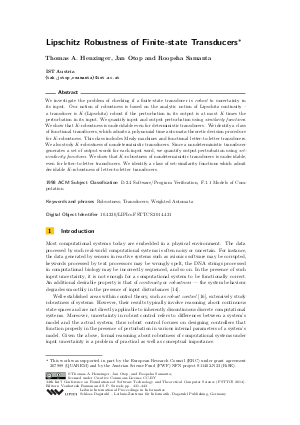Lipschitz Robustness of Finite-state Transducers
Authors Thomas A. Henzinger, Jan Otop, Roopsha Samanta
-
Part of:
Volume:
34th International Conference on Foundation of Software Technology and Theoretical Computer Science (FSTTCS 2014)
Part of: Series: Leibniz International Proceedings in Informatics (LIPIcs)
Part of: Conference: IARCS Annual Conference on Foundations of Software Technology and Theoretical Computer Science (FSTTCS) - License:
 Creative Commons Attribution 3.0 Unported license
Creative Commons Attribution 3.0 Unported license
- Publication Date: 2014-12-12
File

PDF
LIPIcs.FSTTCS.2014.431.pdf
- Filesize: 0.53 MB
- 13 pages
Document Identifiers
Subject Classification
Keywords
- Robustness
- Transducers
- Weighted Automata
Metrics
- Access Statistics
-
Total Accesses (updated on a weekly basis)
0PDF Downloads0Metadata Views
Abstract
We investigate the problem of checking if a finite-state transducer is robust to uncertainty in its input. Our notion of robustness is based on the analytic notion of Lipschitz continuity - a transducer is K-(Lipschitz) robust if the perturbation in its output is at most K times the perturbation in its input. We quantify input and output perturbation using similarity functions. We show that K-robustness is undecidable even for deterministic transducers. We identify a class of functional transducers, which admits a polynomial time automata-theoretic decision procedure for K-robustness. This class includes Mealy machines and functional letter-to-letter transducers. We also study K-robustness of nondeterministic transducers. Since a nondeterministic transducer generates a set of output words for each input word, we quantify output perturbation using set-similarity functions. We show that K-robustness of nondeterministic transducers is undecidable, even for letter-to-letter transducers. We identify a class of set-similarity functions which admit decidable K-robustness of letter-to-letter transducers.
Cite As Get BibTex
Thomas A. Henzinger, Jan Otop, and Roopsha Samanta. Lipschitz Robustness of Finite-state Transducers. In 34th International Conference on Foundation of Software Technology and Theoretical Computer Science (FSTTCS 2014). Leibniz International Proceedings in Informatics (LIPIcs), Volume 29, pp. 431-443, Schloss Dagstuhl – Leibniz-Zentrum für Informatik (2014)
https://doi.org/10.4230/LIPIcs.FSTTCS.2014.431
BibTex
@InProceedings{henzinger_et_al:LIPIcs.FSTTCS.2014.431,
author = {Henzinger, Thomas A. and Otop, Jan and Samanta, Roopsha},
title = {{Lipschitz Robustness of Finite-state Transducers}},
booktitle = {34th International Conference on Foundation of Software Technology and Theoretical Computer Science (FSTTCS 2014)},
pages = {431--443},
series = {Leibniz International Proceedings in Informatics (LIPIcs)},
ISBN = {978-3-939897-77-4},
ISSN = {1868-8969},
year = {2014},
volume = {29},
editor = {Raman, Venkatesh and Suresh, S. P.},
publisher = {Schloss Dagstuhl -- Leibniz-Zentrum f{\"u}r Informatik},
address = {Dagstuhl, Germany},
URL = {https://drops.dagstuhl.de/entities/document/10.4230/LIPIcs.FSTTCS.2014.431},
URN = {urn:nbn:de:0030-drops-48614},
doi = {10.4230/LIPIcs.FSTTCS.2014.431},
annote = {Keywords: Robustness, Transducers, Weighted Automata}
}
Author Details
References
-
S. Almagor, U. Boker, and O. Kupferman. What’s Decidable about Weighted Automata? In ATVA, pages 482-491. LNCS 6996, Springer, 2011.

-
R. Bloem, K. Greimel, T. Henzinger, and B. Jobstmann. Synthesizing Robust Systems. In Formal Methods in Computer Aided Design (FMCAD), pages 85-92, 2009.

-
R. K. Bradley and I. Holmes. Transducers: An Emerging Probabilistic Framework for Modeling Indels on Trees. Bioinformatics, 23(23):3258-3262, 2007.

-
P. Cerny, T. Henzinger, and A. Radhakrishna. Simulation Distances. In Conference on Concurrency Theory (CONCUR), pages 253-268, 2010.

-
Krishnendu Chatterjee, Laurent Doyen, and Thomas A. Henzinger. Alternating weighted automata. In FCT, volume 5699 of LNCS, pages 3-13. Springer, 2009.

-
Krishnendu Chatterjee, Laurent Doyen, and Thomas A. Henzinger. Quantitative languages. ACM Trans. Comput. Log., 11(4), 2010.

-
S. Chaudhuri, S. Gulwani, and R. Lublinerman. Continuity Analysis of Programs. In Principles of Programming Languages (POPL), pages 57-70, 2010.

-
S. Chaudhuri, S. Gulwani, R. Lublinerman, and S. Navidpour. Proving Programs Robust. In Foundations of Software Engineering (FSE), pages 102-112, 2011.

-
L. Doyen, T. A. Henzinger, A. Legay, and D. Ničković. Robustness of Sequential Circuits. In Application of Concurrency to System Design (ACSD), pages 77-84, 2010.

-
Manfred Droste, Werner Kuich, and Heiko Vogler. Handbook of Weighted Automata. Springer Publishing Company, Incorporated, 1st edition, 2009.

-
J. Filar and K. Vrieze. Competitive Markov Decision Processes. Springer-Verlag New York, Inc., New York, USA, 1996.

-
E. M. Gurari and O. H. Ibarra. A Note on Finitely-Valued and Finitely Ambiguous Transducers. Mathematical Systems Theory, 16(1):61-66, 1983.

-
D. Gusfield. Algorithms on Strings, Trees, and Sequences. Cambridge University Press, 1997.

-
T. A. Henzinger. Two Challenges in Embedded Systems Design: Predictability and Robustness. Philosophical Transactions of the Royal Society, 366:3727-3736, 2008.

-
T. A. Henzinger, J. Otop, and R. Samanta. Lipschitz Robustness of Finite-state Transducers. CoRR, abs/1404.6452, 2014.

-
K. Zhou and J. C. Doyle and K. Glover. Robust and Optimal Control. Prentice Hall, 1996.

-
Daniel Krob. The equality problem for rational series with multiplicities in the tropical semiring is undecidable. IJAC, 4(3):405-426, 1994.

-
R. Majumdar, E. Render, and P. Tabuada. A Theory of Robust Omega-regular Software Synthesis. ACM Transactions on Embedded Computing Systems, 13, 2013.

-
R. Majumdar and I. Saha. Symbolic Robustness Analysis. In IEEE Real-Time Systems Symposium, pages 355-363, 2009.

-
M. Mohri. Finite-state Transducers in Language and Speech Processing. Computational Linguistics, 23(2):269-311, 1997.

-
R. Samanta, J. V. Deshmukh, and S. Chaudhuri. Robustness Analysis of Networked Systems. In Verification, Model Checking, and Abstract Interpretation (VMCAI), pages 229-247, 2013.

-
R. Samanta, J. V. Deshmukh, and S. Chaudhuri. Robustness Analysis of String Transducers. In ATVA, pages 427-441. LNCS 8172, Springer, 2013.

-
P. Tabuada, A. Balkan, S. Y. Caliskan, Y. Shoukry, and R. Majumdar. Input-Output Robustness for Discrete Systems. In International Conference on Embedded Software (EMSOFT), 2012.

-
M. Veanes, P. Hooimeijer, B. Livshits, D. Molnar, and N. Bjørner. Symbolic Finite State Transducers: Algorithms and Applications. In Principles of Programming Languages (POPL), pages 137-150, 2012.

